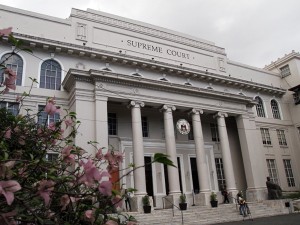SC asked to junk petitions vs Edca
MANILA, Philippines—Government lawyers on Friday asked the Supreme Court to dismiss the petitions seeking to nullify the Enhanced Defense Cooperation Agreement (Edca), which gives the US greater access to military bases in the country.
In a 32-page consolidated comment, the Office of the Solicitor General told the high court that President Benigno Aquino III entered into the 10-year agreement to “promote national security interests.”
“Under Article II, Section 4 of the Constitution, the President, as head of State and chief representative of government, has the prime duty to serve and protect the people,” read the pleading of the nine-member OSG panel.
Acting Solicitor General Florin Hilbay said the President also approved the Edca to implement pre-existing treaties, including the Mutual Defense Treaty (MDT) and the Visiting Forces Agreement (VFA).
“What the Edca does is to enhance the existing contractual security apparatus between the Philippines and the US, set up through the MDT and the VFA. It is the duty of the Honorable Court to allow this security apparatus enough breathing space to respond to perceived, anticipated, and actual exigencies,” he said.
Article continues after this advertisementHilbay pointed out that the agreement is significant in addressing the country’s external and internal security concerns.
Article continues after this advertisementInviting the Supreme Court to consider the “international platform of politics” as well as “recent events within Philippine territory,” Hilbay argued that the Edca is one of the security measures necessary “to achieve a minimum credible defense to the manifold security concerns in the West Philippine Sea.”
The court, he said, “should not render the President helpless or impair his ability to set up a national security apparatus in the face of clear, present, and verified reports of activities that endanger the integrity of the Philippine State.”
It also reminded the high tribunal about the separation of powers and how the judiciary has “invariably maintained a deferential attitude to executive decisions on matters of national security.” It said the judiciary shared the President’s job “to uphold national security and protect national territory.”
“In any case, the exercise of the authority to uphold national security has barely any limitations, for the President must be given the widest latitude in balancing the nation’s limited options and calibrating his responses to ensure their maximum intended effect,” the OSG said.
“Judicial deference to decisions relating to national security is also required by the principle of separation of powers,” it said.
The petitioners against Edca include militant groups, lawyers and personalities like former senators Rene Saguisag and Wigberto Tañada, who both voted to kick the US military bases out of the country in 1991.
The Edca, which has an initial term of 10 years, was signed in time for the state visit of US President Barack Obama on April 28 to the Philippines.
The petitioners argued that the government violated several provisions of the Constitution, including the ban on foreign military bases and facilities without Senate concurrence.
They also cited the danger that Edca might facilitate the entry of nuclear weapons into the Philippines, which is barred by the Constitution.
But Hilbay said the “petitioners speculate that the separate agreements under the Edca will violate various Philippine laws and operate as a blank check to broaden the coverage of the Edca. These speculations cannot be the basis of a constitutional challenge.”
“For a case to be considered ripe for adjudication, “[i]t is a prerequisite that something had by then been accomplished or performed… before a court may come into the picture,” it said.
RELATED STORY
For comprehensive coverage, in-depth analysis, visit our special page for West Philippine Sea updates. Stay informed with articles, videos, and expert opinions.
